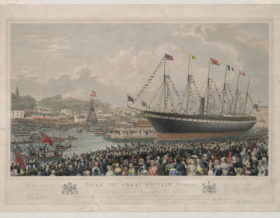Challenging slavery: abolition and opposition
Between the 1500s and early 1800s, millions of Africans were kidnapped, sold and transported to the Americas to work as slaves, in unimaginably cruel conditions, on hugely profitable plantations. These plantations, producing sugar, coffee, cotton and other goods, were largely owned by Europeans and Euro-Americans. Britain grew rich on the profits from this transatlantic slave trade, which were reinvested into other economic sectors. Only in the late eighteenth century did public opinion slowly begin to turn against the trade in African people. Despite opposition from those who stood to benefit, campaigners for abolition used every way they could, including sugar boycotts, political campaigns, meetings and publications, to bring the issue to people’s attention in Europe. Enslaved Africans also played an essential part, having consistently found ways to resist their enslavement and treatment through ‘go-slows’, revolts, the ‘underground railroad’ and retention of African culture – essential in resisting attempts to dehumanise them and break their spirit, and kept alive through crafts, language, scientific knowledge, beliefs, philosophy, music and dance.





















